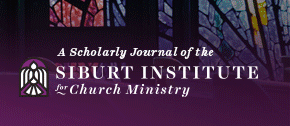Abstract
The church finds itself in a culture that challenges the idea of divine action in the world—one of the results of living in a secular age. We are more likely to talk about “good luck” or “coincidence” than we are about God acting in history. Charles Taylor calls this the immanent frame—that we have constructed a social view that frames our lives without the supernatural. In addition, Hartmut Rosa describes modernity as social acceleration, which puts us out-of-sync in our relationships to others and the world. For the pastor, these cultural and social forces at work often lead to malaise and alienation, which are also widespread in the church. But the pastor is uniquely called to name God’s action and invite the church to recognize it in their everyday lives. This paper proposes that understanding the role of the pastor as poet is a proactive and creative response to these secular developments.
Creative Commons License

This work is licensed under a Creative Commons Attribution 4.0 License.
Recommended Citation
Luben, Zachary J.
(2022)
"Pastor as Poet of the Soul,"
Discernment: Theology and the Practice of Ministry: Vol. 8:
Iss.
2, Article 1.
Available at:
https://digitalcommons.acu.edu/discernment/vol8/iss2/1

